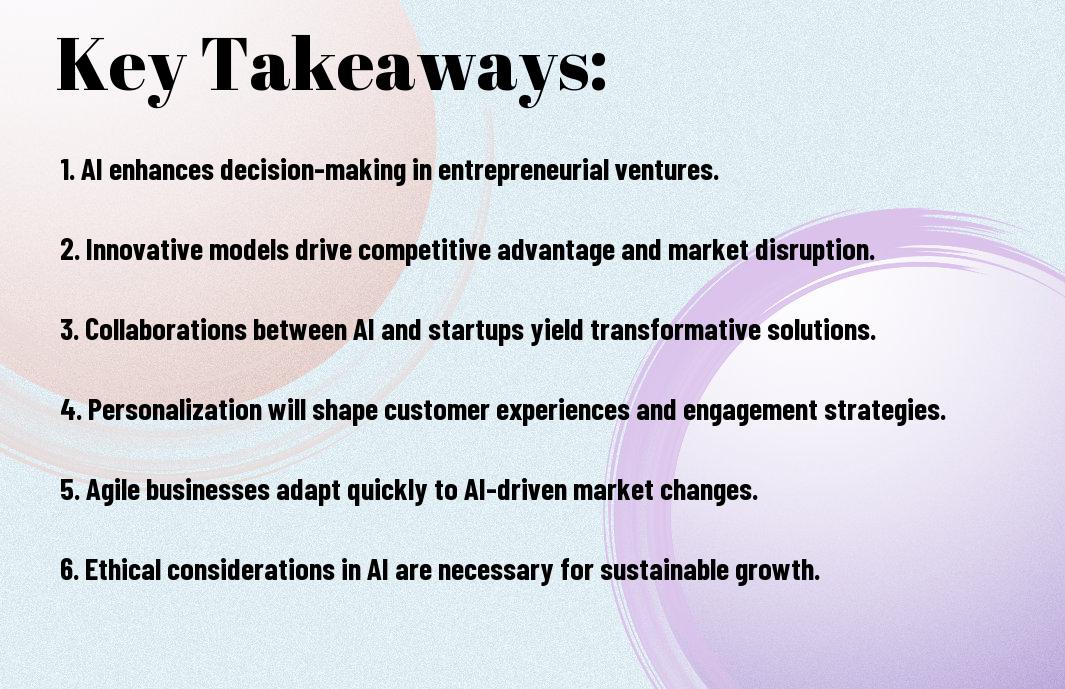As you navigate the ever-changing landscape of entrepreneurship, you’re likely wondering what the future holds for your business. You’re aware that artificial intelligence (AI) is transforming industries, and you’re eager to leverage its power to drive innovation. Your ability to adapt and merge AI with innovative business models will be key to staying ahead of the curve, and this post will explore the exciting possibilities that await you in this rapidly evolving space, helping you shape your entrepreneurial vision.
Key Takeaways:
- The integration of Artificial Intelligence (AI) with innovative business models is set to revolutionize the future of entrepreneurship, enabling businesses to make data-driven decisions, automate processes, and enhance customer experiences.
- Entrepreneurs who successfully merge AI with their business strategies will have a competitive edge in the market, allowing them to scale faster, reduce costs, and improve productivity, ultimately leading to increased revenue and growth.
- As AI technology continues to evolve, it’s crucial for entrepreneurs to stay adaptable and invest in ongoing education and training to leverage the latest advancements and stay ahead of the curve in the ever-changing business landscape.

The AI Revolution in Business
While you navigate the ever-changing landscape of entrepreneurship, you’ll notice that AI is transforming the way businesses operate. You can leverage AI to streamline processes, enhance customer experiences, and drive innovation, giving you a competitive edge in the market.
Machine Learning as a Competitive Edge
Beneath the surface of successful businesses lies the power of machine learning, which enables you to analyze vast amounts of data and make informed decisions. You can utilize machine learning algorithms to identify patterns, predict trends, and optimize your operations, allowing you to stay ahead of the competition.
Predictive Analytics and Decision-Making
Around the concept of predictive analytics, you’ll find a wealth of opportunities to enhance your decision-making capabilities. You can use predictive models to forecast market trends, customer behavior, and potential risks, enabling you to make data-driven decisions that drive your business forward.
The predictive analytics and decision-making capabilities offered by AI are particularly significant for your business, as they allow you to anticipate and respond to changes in the market. You can use predictive analytics to identify new opportunities, mitigate potential risks, and optimize your resources, ultimately leading to increased efficiency and profitability. By leveraging AI-driven predictive analytics, you can make more informed decisions and drive your business towards long-term success.

Reimagining Traditional Business Models
Now, as you explore the future of entrepreneurship, you’ll notice a significant shift in traditional business models, driven by the integration of AI and innovative strategies, allowing you to stay competitive in a rapidly changing market.
Subscription-Based Economies
Above all, you’ll find that subscription-based economies are becoming increasingly popular, offering you a consistent revenue stream and encouraging customer loyalty, as you provide ongoing value to your subscribers through exclusive content, services, or products.
Platform Ecosystems and Network Effects
The success of your business will depend on your ability to create a robust platform ecosystem, where you can leverage network effects to drive growth, by connecting users, providers, and partners, and fostering a community that generates value for all stakeholders involved.
Due to the complexity of platform ecosystems, you’ll need to carefully design and manage the interactions between different components, ensuring that each element reinforces the others, and that your platform is scalable, secure, and adaptable to changing market conditions, allowing you to stay ahead of the competition and achieve long-term success.
The Entrepreneur of Tomorrow
To succeed in the future of entrepreneurship, you will need to adapt to the changing landscape of business and technology. You will have to be adept at leveraging AI and innovative business models to stay ahead of the competition. Your ability to merge these two elements will be key to your success.
Technical Fluency Requirements
After gaining a basic understanding of AI, you will need to develop a deeper understanding of its applications in business. You will have to learn how to work with AI systems and integrate them into your business model, allowing you to make data-driven decisions and drive innovation.
Balancing Humanity and Automation
Below the surface of AI implementation, you will need to consider the human element of your business. You will have to find a balance between automating processes and maintaining a personal touch, ensuring that your customers feel valued and supported throughout their interaction with your company.
Further, as you probe into the world of AI-powered entrepreneurship, you will need to consider the long-term implications of automation on your business and your customers. You will have to ask yourself how you can use AI to enhance the human experience, rather than replace it, and how you can create a business model that prioritizes both efficiency and empathy, allowing you to build strong relationships with your customers and establish a loyal community around your brand.
Funding Landscapes for AI Ventures
Your ability to secure funding is vital for the success of your AI venture, and understanding the current funding landscape is vital to making informed decisions about your business.
Venture Capital Trends
On the heels of significant advancements in AI technology, you’re likely to see venture capital firms investing heavily in AI-focused startups, providing you with potential opportunities for growth and development.
Alternative Financing Models
The rise of alternative financing models, such as crowdfunding and incubators, is providing you with more options to fund your AI venture, allowing you to maintain control and flexibility.
This alternative financing model is particularly beneficial for you, as it enables you to test and validate your business idea without sacrificing equity, while also providing access to a community of supporters and mentors who can offer valuable guidance and expertise, helping you to navigate the challenges of building a successful AI-driven business.
Ethical Considerations
Many entrepreneurs are exploring the potential of AI in their business models, as seen in The Future of Entrepreneurship in a World Where AI is Dominating – Due, but you must consider the ethical implications of these innovations, ensuring that your business practices are transparent and fair.
Data Privacy Concerns
Above all, you need to prioritize the security of your customers’ data, protecting it from potential breaches and misuse, as you integrate AI into your business model.
Algorithmic Accountability
Across various industries, you will encounter complex algorithms that can impact your decision-making processes, and it’s crucial to understand how they work to maintain accountability.
For instance, as you develop and implement AI-powered systems, you should be aware of the potential biases and errors that can occur, taking steps to mitigate these issues and ensure that your algorithms are fair and transparent, allowing you to build trust with your customers and stakeholders.
Global Market Adaptations
For businesses to thrive in the future, you will need to adapt to the global market’s evolving landscape, where AI-driven innovations are redefining industry norms and creating new opportunities for growth and expansion.
Regional AI Development Disparities
Furthermore, you should consider the varying levels of AI adoption across different regions, as this will impact your business strategy and ability to compete in the global market, with some areas being more AI-savvy than others.
Cross-Border Entrepreneurial Opportunities
Meanwhile, you will find that the increasing use of AI is opening up new avenues for cross-border entrepreneurship, enabling you to tap into global talent pools, access new markets, and collaborate with international partners to drive innovation and growth.
Indeed, as you explore cross-border entrepreneurial opportunities, you will discover that AI can help you navigate the complexities of international trade, facilitate communication across linguistic and cultural barriers, and provide valuable insights into local market trends and consumer behavior, allowing you to make informed decisions and stay ahead of the competition in the global marketplace.
Conclusion
Considering all points, you can see that the future of entrepreneurship is heading towards a significant transformation. As you explore the possibilities of merging AI with innovative business models, you will unlock new opportunities for growth and success. Your ability to adapt and leverage these advancements will be key to staying ahead in the market, and you can expect your business to thrive in this exciting new landscape.
FAQ
Q: What role will Artificial Intelligence (AI) play in shaping the future of entrepreneurship?
A: AI will play a significant role in shaping the future of entrepreneurship by automating routine tasks, providing data-driven insights, and enhancing decision-making processes. As AI technology advances, entrepreneurs will be able to leverage its capabilities to develop innovative business models, improve operational efficiency, and create new products and services that meet the evolving needs of customers. By merging AI with traditional business practices, entrepreneurs can unlock new opportunities for growth, increase competitiveness, and stay ahead of the curve in a rapidly changing market.
Q: How will the integration of AI with innovative business models impact the way entrepreneurs approach product development and customer engagement?
A: The integration of AI with innovative business models will revolutionize the way entrepreneurs approach product development and customer engagement. With AI-powered tools, entrepreneurs can analyze vast amounts of customer data to identify trends, preferences, and pain points, enabling them to create personalized products and services that meet specific needs. Additionally, AI-driven chatbots and virtual assistants will enable entrepreneurs to provide 24/7 customer support, enhancing the overall customer experience and building brand loyalty. By leveraging AI, entrepreneurs can develop more effective go-to-market strategies, improve customer retention, and drive business growth.
Q: What are some potential challenges that entrepreneurs may face when merging AI with innovative business models, and how can they overcome them?
A: Entrepreneurs may face several challenges when merging AI with innovative business models, including data quality issues, talent acquisition and retention, and ensuring transparency and accountability in AI-driven decision-making. To overcome these challenges, entrepreneurs can invest in data management and analytics, develop strategic partnerships with AI technology providers, and prioritize ongoing education and training for their teams. Moreover, entrepreneurs should establish clear guidelines and protocols for AI adoption, ensuring that AI systems are aligned with business objectives and values. By being aware of these potential challenges, entrepreneurs can proactively develop strategies to mitigate risks and maximize the benefits of AI adoption.
Q: How will the future of entrepreneurship be impacted by the increasing use of AI-powered automation and machine learning algorithms?
A: The increasing use of AI-powered automation and machine learning algorithms will significantly impact the future of entrepreneurship by enabling businesses to operate more efficiently, make data-driven decisions, and innovate at a faster pace. As automation takes over routine and repetitive tasks, entrepreneurs will be able to focus on high-value activities such as strategy development, creativity, and customer engagement. Moreover, machine learning algorithms will enable businesses to analyze vast amounts of data, identify patterns, and make predictions, allowing entrepreneurs to develop more effective marketing strategies, optimize operations, and improve overall performance. By embracing AI-powered automation and machine learning, entrepreneurs can unlock new opportunities for growth, improve competitiveness, and drive innovation.
Q: What skills and knowledge will entrepreneurs need to acquire to successfully merge AI with innovative business models and stay competitive in the future?
A: To successfully merge AI with innovative business models, entrepreneurs will need to acquire a range of skills and knowledge, including data analysis and interpretation, AI and machine learning fundamentals, and strategic thinking. They will also need to develop a deep understanding of their customers, markets, and industries, as well as the ability to adapt to rapidly changing technologies and trends. Additionally, entrepreneurs should prioritize ongoing education and training, staying up-to-date with the latest AI technologies, tools, and methodologies. By acquiring these skills and knowledge, entrepreneurs can develop the expertise needed to leverage AI, drive innovation, and stay competitive in a rapidly evolving business landscape.



